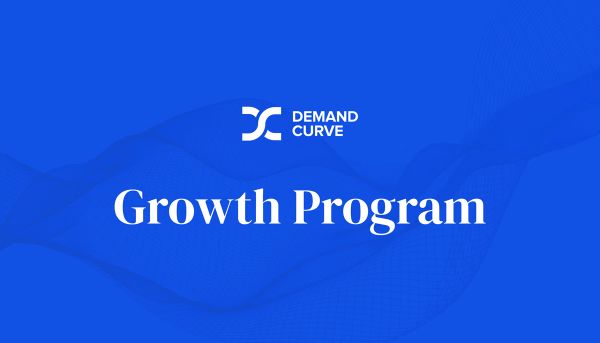[Download] Growth Program 2.0 – Demand Curve
$995.00 Original price was: $995.00.$35.00Current price is: $35.00.
- Delivery: You Will Receive A Receipt With Download Link Through Email.
- If you need more proof ofcourse, feel free to chat with me!

Description
Table of Contents
ToggleProof of payment:

The landscape of ecom growth is fiercely competitive, demanding not just innovative products but equally sophisticated strategies for customer acquisition and retention. In this relentless pursuit of market share, startups often find themselves at a critical juncture, facing formidable challenges that can determine their very survival. Understanding these hurdles and charting a clear, tactical path forward is paramount for any business aiming for sustainable expansion in the digital marketplace.
Ecom Growth
The aspiration for rapid ecom growth is a universal driving force for startups, yet the path to achieving it is riddled with complexities, where marketing frequently emerges as the most significant hurdle. Data suggests a staggering 55% of startups falter due to marketing-related problems, a statistic that underscores the profound disconnect between product innovation and market penetration. This isn’t merely a niche issue; it’s a systemic vulnerability that plagues early-stage companies, especially those in the B2B and consumer tech sectors that form the backbone of modern e-commerce. As AI continuously simplifies product development and launch, the real battleground has shifted unequivocally to consistent customer acquisition.
Founders, often brilliant in their product vision, find themselves ill-equipped to navigate the treacherous waters of digital marketing, caught between two fundamentally flawed traditional options: a risky DIY approach that consumes invaluable months, or the exorbitant gamble on costly marketers or agencies that most early-stage ventures simply cannot afford. This creates a debilitating talent scarcity, where individuals possessing both strategic foresight and tactical execution skills for early-stage growth are a rare and precious commodity. The inherent difficulties in scaling customer acquisition while maintaining capital efficiency are magnified in the e-commerce space, where competition is high, advertising costs are rising, and consumer attention is fragmented across myriad channels.
To truly unlock robust ecom growth, startups need a paradigm shift, moving away from theoretical frameworks and towards actionable, operator-led guidance that directly addresses these pervasive issues. The traditional growth paths are not just suboptimal; they are fundamentally broken for the majority of fledgling companies striving to secure their foothold in the market and scale efficiently. This necessitates an entirely new operating system for growth, one that is built on proven strategies, guided by experienced operators, and supported by modern tools to democratize effective marketing for the masses of aspiring ventures.
The Marketing Conundrum and Its Impact on Ecom Growth
The pervasive marketing conundrum directly impacts ecom growth by creating a bottleneck that severely limits a startup’s potential. It’s a cruel irony that despite an entrepreneur’s ingenuity in crafting a compelling product, the lack of an effective go-to-market strategy can lead to its premature demise. The 55% failure rate due to marketing problems is a stark reminder that brilliant ideas alone cannot guarantee success; they must be paired with an equally brilliant execution strategy for customer outreach and engagement. This problem is particularly acute in e-commerce, where visibility and direct customer connection are paramount. Without a clear, cost-effective method to acquire and retain customers, an e-commerce startup, no matter how innovative its product, will struggle to gain traction against larger, better-funded competitors who have mastered the art of digital marketing.
My personal analysis suggests that much of this struggle stems from a fragmented understanding of the marketing ecosystem. Founders often possess domain expertise but lack the comprehensive, full-funnel knowledge required to build a cohesive growth engine. They might excel at creating a fantastic product page but stumble when it comes to driving targeted traffic, optimizing conversion rates, or implementing effective retention strategies. The sheer number of marketing channels, tools, and methodologies available today can be overwhelming, leading to “analysis paralysis” as founders spend months second-guessing decisions rather than executing. This paralysis is fatal in the fast-paced world of e-commerce, where market windows are fleeting, and customer preferences evolve rapidly.
Ultimately, the impact on ecom growth is both direct and devastating. Without a steady influx of new customers and a strong retention loop, revenue stagnates, cash flow dwindles, and investor confidence wanes. The high cost and scarcity of effective marketing talent mean that many early-stage e-commerce businesses are left experimenting inefficiently, burning through precious capital on strategies that yield minimal returns. This environment precisely underscores the need for a structured, tactical, and operator-led approach to marketing – one that cuts through the noise and provides clear, actionable steps for founders to acquire and retain customers efficiently, ensuring that product excellence is matched by market success.
Redefining Traditional Growth Paths for Digital Commerce
The traditional paths to startup growth, once considered standard, are now demonstrably broken, especially when applied to the dynamic realm of digital commerce and ecom growth. The Demand Curve Founder, Justin Setzer, articulated this perfectly: “Our team has spent years leading growth at successful startups and working with hundreds more through our agency. Over time, we noticed a clear pattern: most founders don’t struggle because they lack intelligence or hustle. They struggle because the traditional paths to growth are broken.” This profound observation highlights a critical systemic flaw rather than an individual failing. For early-stage e-commerce companies, the choice between DIY experimentation and expensive, often hit-or-miss, external hires represents a binary of suboptimal options that squander time, capital, and mental energy. The rapid evolution of channels, algorithms, and consumer behavior means that what worked even a few years ago might be obsolete today, rendering generic “best practices” largely ineffective.
My creative insight into this redefinition comes from observing the accelerating pace of digital innovation. The “new bottleneck” isn’t product development; it’s customer acquisition. AI has commoditized product creation to an extent, democratizing the ability to launch. However, effectively getting that product into the hands of the right customers and building a loyal following is now the primary challenge. E-commerce founders need more than just general marketing advice; they need tailored, tactical playbooks that account for their specific business model (B2B tech, consumer tech, mobile app, etc.) and current stage. They need systems, not just strategies, that cover the entire customer journey from acquisition to activation, monetization, and retention, recognizing that each stage presents unique challenges in a digital-first context.
This redefinition emphasizes a shift from a theoretical or outsourced model to an internalized, execution-focused approach supported by expert guidance. It’s about empowering founders to become proficient growth operators themselves, not just delegating critical functions to external parties. For ecom growth, this means providing robust, step-by-step project plans that guide the implementation of specific growth tactics – whether it’s setting up effective paid ad campaigns, optimizing product-led onboarding flows, or building compelling content for organic reach. The inclusion of an AI co-pilot, alongside human expert guidance, underscores a forward-thinking integration of technology to augment founder capabilities, offering “exact instructions” that eliminate guesswork and accelerate the learning curve. This comprehensive, actionable framework is precisely what’s required to move beyond the broken traditional paths and forge a sustainable trajectory for digital commerce success.
The Demand Curve Growth Program: A Catalyst for Ecom Success
The Demand Curve Growth Program emerges as a direct response to these broken growth paradigms, positioning itself as a comprehensive startup growth operating system meticulously designed to provide a low-risk, rapid path for startups to acquire and retain customers, particularly vital for ecom growth. It explicitly rejects theoretical approaches in favor of a tactical, execution-focused curriculum built by operators with experience generating over $1 billion in startup growth. This emphasis on “zero fluff” and battle-tested methods is a crucial differentiator, recognizing that early-stage e-commerce ventures need actionable playbooks far more than high-level strategic pronouncements. The program’s core lies in its multi-faceted platform, guiding startups from foundational learning through robust execution and scaling.
The platform provides a structured environment for learning and application. The core offering is a platform that combines:
- Learn: Provides access to a tactical growth curriculum that is tailored to the specific needs of the startup.
- Build: Offers step-by-step projects that provide exact instructions for implementing growth strategies.
- Expert Guidance: Includes coaching from the Demand Curve team and support from a proprietary AI growth co-pilot.
- Hire: Connects startups with vetted partners when they are prepared to scale their growth teams.
- The Vault: A members-only repository of bonus tools, templates, and exclusive deals.
From a creative insight perspective, what makes this particularly powerful for ecom growth is its “company-specific tracks” philosophy. While “Mobile App Startups,” “Agencies & Tech-Enabled Services,” “Education & Media Startups,” and “Marketplaces” are coming soon, the existing “B2B Tech Startups” and “Consumer Tech Startups” tracks are immediately relevant. Many e-commerce businesses fall into these categories, requiring distinct strategies for scaling acquisition, optimizing conversion, and driving retention and Lifetime Value (LTV). A B2B e-commerce platform selling specialized components, for instance, requires different lead generation and sales-led approaches than a consumer e-commerce brand selling fashion or home goods. The program’s ability to tailor content means that a founder isn’t just learning general marketing principles but rather strategies specifically designed for their business model challenges, enabling them to focus precisely on what will move the needle for their specific ecom growth objectives.
The curriculum’s content philosophy, built on “Core Content Pillars,” represents a significant leap forward for e-commerce. It encompasses a “Zero Fluff Approach” (no theory, just tactical systems from operators), “Company Tracks” (tailored growth plans by business type and stage), “Comprehensive Playbooks” (a library of over 55 tactics), “Full-Funnel Growth” (acquisition, activation, monetization, retention), and “Modern Growth Motions” (product-led, sales-led, content-led, paid-led). This holistic and tactical foundation empowers e-commerce founders to systematically address every stage of the customer journey, from initial awareness to long-term loyalty. By providing “exact instructions” and expert guidance, Demand Curve acts as a crucial safety net and accelerator for startups struggling to gain traction or overwhelmed by options, turning potential failures into success stories and truly fueling their ecom growth.
Torous
In the challenging pursuit of ecom growth, where traditional pathways often prove insufficient, it becomes imperative to embrace a more robust and interconnected framework for scaling. The concept of “Torous” offers a powerful metaphor for such a framework – envisioning growth not as a linear, easily disrupted process, but as a continuous, self-sustaining loop, much like the geometric shape of a torus. This model emphasizes resilience, interconnectedness, and the cyclical nature of successful customer acquisition and retention strategies, moving beyond fragmented tactics to a unified, feedback-driven system. Just as a torus has no beginning or end, a truly effective growth strategy for e-commerce needs to be cyclical, perpetually learning, adapting, and reinforcing itself. It’s about building a marketing engine that is robust and self-correcting, capable of withstanding market fluctuations and continuously generating value.
This perspective complements the tactical rigor of programs like Demand Curve by providing an overarching philosophical lens through which to view and implement those tactics. It suggests that every marketing activity, from initial outreach to post-purchase engagement, should feed back into improving the overall system, rather than existing as isolated efforts. For startups aiming for enduring ecom growth, adopting a “Torous” mindset means prioritizing iterative improvements, fostering strong feedback loops between different departments, and understanding that the journey of growth is not a sprint, but an ongoing, interconnected cycle of learning, building, and optimizing. It re-frames the idea of “failure” not as an end, but as valuable data points within the continuous loop of refinement.
Building Torous Resilience in E-commerce Marketing
In the unpredictable currents of ecom growth, building torous resilience in marketing isn’t just advantageous—it’s essential for survival. A resilient marketing system, much like the continuous, robust structure of a torus, stands in stark contrast to brittle, linear approaches that break under pressure. This means creating a multi-faceted and integrated strategy where individual channels and tactics are not isolated, but rather reinforce each other, forming a coherent and adaptive whole. For instance, rather than seeing paid ads, SEO, social media, and email marketing as separate silos, a torous approach integrates them into a unified customer journey where insights from one channel inform and optimize efforts in another. If paid social campaigns identify a high-converting audience segment, that data should immediately inform content strategy for organic channels and personalization for email flows. This interconnectedness allows the entire system to absorb shocks, like changes in platform algorithms or shifts in consumer behavior, without collapsing entirely.
My creative insight here is to view each touchpoint in the e-commerce customer journey as a segment of the torous loop. A customer might discover a product via a targeted ad, browse on the website, receive a personalized email, engage with social proof, and then make a purchase. Each of these interactions, rather than being a standalone event, provides data that should feed back into optimizing the entire loop. For example, high bounce rates on product pages suggest a need for better content or clearer value propositions, while strong engagement with unboxing videos points to an opportunity for user-generated content campaigns. The “Torous Resilience” approach dictates that rather than patching individual leaks, we’re constantly strengthening the integrity of the entire structure. This continuous feedback and adaptation are crucial for sustainable ecom growth, ensuring that the system is always improving and never static.
Furthermore, implementing torous resilience requires a commitment to continuous learning and iteration, a core tenet exemplified by programs that emphasize operator-led, tactical curriculum. It means actively seeking out patterns in data, understanding customer feedback, and being willing to rapidly pivot or optimize strategies based on real-world results. This isn’t about blind experimentation but informed iteration, guided by clear metrics and a deep understanding of the full-funnel customer journey. For an e-commerce business, this translates to having robust analytics in place, conducting regular A/B tests on landing pages and ad copy, and fostering a culture where every team member is attuned to customer signals. By embedding these feedback loops and interconnected strategies, e-commerce brands can build marketing systems that are not only resilient but also self-improving, ensuring long-term ecom growth even in the face of ever-evolving market dynamics.
The Interconnectedness of Growth: A Torous System Approach
The true power of a torous system approach to ecom growth lies in its emphasis on interconnectedness. In this model, every element of a startup’s growth strategy – from product development to customer support, from acquisition channels to retention tactics – is seen as an integral part of a larger, self-reinforcing whole. This moves beyond the outdated linear funnel model, which often treats customer acquisition as an endpoint, towards a cyclical view where customer satisfaction and loyalty fuel new acquisitions through word-of-mouth, reviews, and community engagement. For an e-commerce business, this means understanding that a positive post-purchase experience is not merely good customer service; it’s a powerful marketing tool that reduces churn and acts as a potent, organic acquisition channel. Investing in exceptional unboxing experiences or proactive customer support thus becomes a direct contributor to future growth, completing the torous loop.
My analysis suggests that many startups, particularly in early stages, struggle with this integrated perspective because of siloed operations. The marketing team might focus solely on attracting new users, while the product team iterates on features, and customer service handles inquiries, often without a cohesive strategy knitting these efforts together. A torous system, however, necessitates breaking down these silos. It champions cross-functional collaboration, ensuring that insights from customer support regarding common pain points inform product development decisions, which in turn might provide new features for marketing to highlight. Similarly, data on customer lifetime value (LTV) from retention efforts should directly influence the budget allocation for acquisition campaigns, ensuring that resources are directed towards channels that bring not just customers, but valuable customers. This holistic view is critical for optimizing resource allocation and maximizing return on investment, guiding early-stage companies to make smarter, more integrated decisions for their ecom growth.
Furthermore, the torous system approach recognizes that effective growth is not solely about external facing marketing activities but also about internal capabilities. This is where the “Hire” component of comprehensive growth programs becomes crucial. As a startup scales, it needs to build an internal team that understands and can perpetuate this integrated, cyclical growth mindset. Connecting with vetted hiring partners ensures that companies acquire talent not just with tactical skills, but with an understanding of how their role integrates into the larger torous system of growth. This continuity of expertise, from initial learning and building to scaling the team, is central to creating a self-sustaining growth engine. By fostering this interconnectedness across all levels – strategy, operations, and talent – e-commerce businesses can build a durable and dynamic growth system that consistently drives value and ensures sustained ecom growth in a complex, competitive market.
Integrating Torous Thinking with Tactical Execution for Exponential Ecom Growth
Integrating torous thinking with tactical execution is the linchpin for achieving exponential ecom growth. While the torous concept provides the strategic framework for continuous, interconnected, and resilient growth, it is the tactical, step-by-step curriculum and guidance offered by programs like Demand Curve that bring this vision to life. This synergy means that founders are not just given a grand strategy; they are equipped with the “exact instructions” to implement it, allowing them to build systems that reflect the torous ideal. For example, understanding that customer reviews are crucial for social proof (a part of the acquisition and retention loop in a torous system) is one thing; having a step-by-step project plan to generate and amplify those reviews—detailing specific email sequences, platform integrations, and incentive structures—is the tactical execution that closes the loop operationally. This is where the rubber meets the road, transforming abstract principles into tangible, measurable results for ecom growth.
My personal analysis suggests that the true genius of combining these two concepts lies in empowering founders to bypass common pitfalls. Many e-commerce startups get stuck in either purely theoretical ideation (lacking tactical blueprints) or fragmented tactical execution (lacking a cohesive strategic framework). The Demand Curve curriculum, with its “Core Content Pillars” like “Full-Funnel Growth” and “Modern Growth Motions,” effectively guides the implementation of a torous strategy. By covering acquisition, activation, monetization, and retention, it naturally encourages a cyclical view of the customer journey. Furthermore, by teaching specific techniques for product-led, sales-led, content-led, and paid-led acquisition, it provides the tools to build diverse, interconnected channels that contribute to the overall resilience of the torous system, ensuring that an issue in one channel doesn’t derail the entire growth effort for ecom growth.
The AI co-pilot and expert guidance within such programs also play a pivotal role in refining this integration. The AI can help founders iterate on ad copy, optimize landing page elements, or analyze data patterns, all within the framework of their established torous strategy. This real-time feedback and assistance expedite the learning curve and reduce the margin for error, allowing for quicker implementation and optimization of tactical plans. The expert guidance from seasoned operators ensures that founders are applying the torous model in a contextually appropriate manner, fine-tuning their execution based on proven best practices. Ultimately, this symbiotic relationship between strategic torous thinking and precise tactical execution is what enables early-stage e-commerce companies to move beyond simply surviving to thriving, carving out a rapid and sustainable path to substantial ecom growth by creating a self-reinforcing, resilient, and continuously optimizing growth engine.
Conclusion
The pursuit of sustainable ecom growth for early-stage startups is fraught with challenges, primarily stemming from flawed traditional marketing paths and a severe scarcity of effective growth talent, leading to a staggering 55% failure rate for marketing-related problems. Programs like the Demand Curve Growth Program directly address these systemic issues, offering a comprehensive, operator-led, and tactical operating system designed to provide a low-risk, rapid path for customer acquisition and retention.
Through a platform that integrates tailored learning, step-by-step project plans, expert guidance, an AI co-pilot, and hiring partnerships, it empowers founders to overcome analysis paralysis and build robust marketing engines. This approach is further fortified by embracing a “Torous” mindset, which envisions growth as a continuous, interconnected, and resilient loop rather than a linear, easily disrupted process, emphasizing feedback, iteration, and cross-functional synergy. By combining tactical execution with this strategic torous framework, e-commerce startups can build self-sustaining growth systems that are adaptive to market changes, consistently optimize performance, and ultimately achieve accelerated and enduring ecom growth.
Sales Page:_https://www.demandcurve.com/
Delivery time: 12 -24hrs after paid
Related products
-
Sale!

Caleb Boxx – YouTube Income Automation Academy
$597.00Original price was: $597.00.$29.00Current price is: $29.00. -
Sale!

Robby Blanchard Commission Hero AI
$997.00Original price was: $997.00.$39.00Current price is: $39.00. -
Sale!

[GroupBuy] Coach Kyle – Confidence and Self Mastery [November 2024]
$125.00Original price was: $125.00.$72.00Current price is: $72.00. -
Sale!

[GroupBuy] Centerpointe – Life Principles Integration Process
$239.00Original price was: $239.00.$99.00Current price is: $99.00.

Reviews
There are no reviews yet.